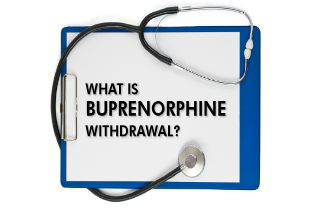What is buprenorphine withdrawal syndrome?
Buprenorphine withdrawal syndrome occurs when your body becomes dependent on the use of buprenorphine to function normally. Buprenorphine stays in your system for quite a while, but when stop taking buprenorphine suddenly, levels drop and you are left to withdraw. This is characterized by a series of typical symptoms which occur when you stop taking or drastically reduce doses of buprenorphine after the half life of buprenorphine wears off. It is always important to consult a doctor when withdrawing from buprenorphine in order to assess your personal needs during withdrawal and to make sure you are withdrawing safely from the drug.
Ironically, buprenorphine is typically prescribed to help ease the symptoms of withdrawal from stronger opiates or opioids. However, taking buprenorphine for opioid addiction can be addictive itself because it is a partial opioid-agonist. This means that buprenorphine binds to the same receptors and can produce the same euphoric and respiratory depressing affects as other opioids. Though the symptoms are not as effective as using other opioids, it is still possible to achieve the desired affects with buprenorphine use.
What is withdrawal from buprenorphine like?
The symptoms of buprenorphine withdrawal are similar to those of other opioids, although they are typically milder. Withdrawal from buprenorphine is like a severe flu combined with mood disorders. When withdrawing from buprenorphine, symptoms that may occur include nausea, headaches, changes in sleeping habits, changes in appetite, mood swings, cold sweats, flu-like symptoms and body aches. These symptoms can vary depending on the severity of dependence and the length of use for each person. Some people may face severe withdrawal symptoms, which can peak 2-5 days after the last dose, while others may only see mild withdrawal symptoms.
What does buprenorphine withdrawal feel like?
Buprenorphine withdrawal feels like being sick with a mild flu, but can also make you feel in a very bad mood. Buprenorphine withdrawal symptoms can begin as soon as you take your last dose. You will begin to feel mild symptoms at first, and symptoms typically peak in severity after 2 – 5 days of withdrawal. Depending on the severity of physical dependence, buprenorphine withdrawal symptoms can last anywhere from a couple of weeks, to months following your final dosage. The symptoms that tend to last the longest are the psychological symptoms of dependence on buprenorphine. Seeking treatment for cravings using psychotherapy or intense behavioral therapy can reduce the need to use buprenorphine over time. Untreated, psychological symptoms of buprenorphine withdrawal can last for a long period of time, even after other symptoms have subsided.
What helps buprenorphine withdrawal?
Detox – Detoxification is the process by which you remove buprenorphine and other drug toxins from your system, before seeking other forms of treatment. Naloxone can help during detox, which counters the euphoric effects of buprenorphine as a partial opioid-agonist. While detox treats buprenorphine dependence, it is only the start of the process of a full treatment for someone addicted to buprenorphine. Detox comes in three important stages: evaluation, stabiization and fostering patient readiness for and entry into treatment. Without all three of these components being employed, chances of staying off buprenorphine are minimized.
Home Remedies – Home remedies for buprenorphine withdrawal focus on addressing and supporting withdrawal symptoms as they occur. For body aches and other pain, use mild pain relievers such as Tylenol or ibuprofen. You can also take warm baths and use heating pads when you experience physical pain. In order to deal with psychological withdrawal symptoms it is important to seek help from a sober friend or family member, or to attend support groups such as Narcotics Anonymous or SMART Recovery.
Medications – Because buprenorphine is the drug used to ease withdrawal and detoxification symptoms, it may be required that quit it altogether without pharmaceutical aid. However, Suboxone may be prescribed during buprenorphine withdrawal because the active ingredient, buprenorphine, is countered by naloxone, which counters the effects of the opioid-agonist.
Questions about buprenorphine withdrawal
Are you seeking help for buprenorphine withdrawal and have questions about treatment or withdrawal? Have you experienced buprenorphine withdrawal and have advice or experience to share? Leave a comment below with yourquestions, comments or concerns and we will respond personally and promptly.









Related Posts